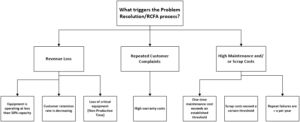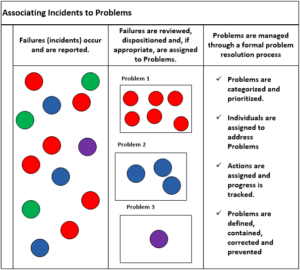This week’s tip continues discussing the Analysis phase of FRACAS.
There are a number of Problem Resolution/Root Cause Failure Analysis (RCFA) processes and tools that are available. So many, in fact, that a variety of books and guides have been written on both the processes that can be used, as well as the tools that can be used to determine the root cause(s).
Before discussing processes or tools, it’s important to note that every failure/incident will not and should not have an RCFA performed. The simple reality is one of resources … the lack thereof. Therefore, failures have to be reviewed and prioritized to determine if an RCFA is even warranted. If an RCFA is required, then the failure incident is assigned to a Problem, and the Problem is tracked and managed through a formal Problem Resolution process which includes conducting the RCFA.
Figure 1 below provides an example of what may occur to trigger the Problem Resolution/RCFA process. It’s vitally important that you determine what your triggers will be, otherwise you’ll risk using resources to resolve low priority problems.
Figure 2 illustrates the Incident-to-Problem relationship. The Incident-to-Problem relationship can have a One-to-One (one Incident to one Problem) relationship or Many-to-One (two or more Incidents to one Problem). Note that the Green dots are not assigned to a Problem because they don’t meet the criteria to trigger an RCFA.
In next week’s tip, we will continue discussing the Problem Resolution/RCFA process.
© 2017 by LinRich Solutions, LLC. All rights reserved




